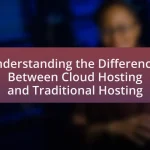A dedicated server is a hosting service that allocates an entire physical server to a single client, providing exclusive access to resources such as CPU, RAM, and storage. This article analyzes the cost-effectiveness of dedicated servers, comparing them to shared hosting and Virtual Private Servers (VPS) in terms of performance, security, and customization. Key features, pricing factors, and the potential benefits of investing in dedicated servers are discussed, alongside considerations for businesses assessing their specific needs. Additionally, the article outlines common pitfalls to avoid and best practices for budgeting and maintenance, ultimately helping businesses determine if a dedicated server is a worthwhile investment.
What is a Dedicated Server?
A dedicated server is a type of hosting service where an entire physical server is allocated to a single client or organization. This setup provides exclusive access to all the server’s resources, including CPU, RAM, and storage, allowing for enhanced performance, security, and customization compared to shared hosting environments. Dedicated servers are often utilized by businesses that require high levels of reliability and control over their hosting environment, particularly for applications with significant traffic or resource demands.
How does a Dedicated Server differ from other hosting options?
A Dedicated Server differs from other hosting options by providing exclusive access to an entire physical server, which enhances performance, security, and customization. Unlike shared hosting, where resources are distributed among multiple users, a Dedicated Server allocates all its resources—CPU, RAM, and storage—solely to one client, resulting in superior speed and reliability. Additionally, compared to Virtual Private Servers (VPS), which share a physical server but offer virtualized resources, a Dedicated Server eliminates the risk of resource contention, ensuring consistent performance. This exclusivity also allows for greater control over server configurations and security measures, making it ideal for businesses with specific needs or high traffic demands.
What are the key features of a Dedicated Server?
A dedicated server offers several key features, including exclusive resources, enhanced performance, and increased security. Exclusive resources mean that all hardware and bandwidth are dedicated solely to one user or organization, which eliminates competition for resources and ensures optimal performance. Enhanced performance is achieved through high processing power and memory capacity, allowing for faster data processing and improved application responsiveness. Increased security is provided by having a private server environment, which reduces vulnerabilities associated with shared hosting and allows for customized security measures. These features make dedicated servers particularly suitable for businesses with high traffic demands and specific security requirements.
Why would businesses choose a Dedicated Server over shared hosting?
Businesses choose a Dedicated Server over shared hosting primarily for enhanced performance and control. Dedicated servers provide exclusive resources, which means that businesses experience faster load times and improved reliability, as they are not competing for bandwidth or processing power with other users. According to a study by HostingAdvice, dedicated servers can handle higher traffic volumes and complex applications more efficiently than shared hosting, which is limited by the shared environment. This performance advantage is crucial for businesses that rely on their online presence for revenue generation and customer engagement.
What are the typical costs associated with a Dedicated Server?
The typical costs associated with a dedicated server range from $100 to $500 per month, depending on specifications and service providers. Factors influencing the cost include hardware specifications such as CPU, RAM, and storage, as well as additional services like managed support, security features, and bandwidth. For instance, a basic dedicated server with standard specifications may cost around $100, while high-performance servers with advanced features can exceed $500 monthly. This pricing structure is supported by industry data from various hosting companies, which consistently show these ranges for dedicated server offerings.
What factors influence the pricing of Dedicated Servers?
The pricing of dedicated servers is influenced by several key factors, including hardware specifications, bandwidth, data center location, and support services. Hardware specifications, such as CPU power, RAM size, and storage type, directly affect the cost, as higher performance components typically command higher prices. Bandwidth requirements also play a significant role; servers with higher data transfer limits or faster connections incur additional costs. The data center’s geographical location impacts pricing due to variations in operational costs, such as electricity and real estate. Lastly, the level of customer support and managed services offered can increase the overall price, as more comprehensive support packages require additional resources.
How do additional services impact the overall cost?
Additional services increase the overall cost of a dedicated server by adding fees for features such as enhanced security, backup solutions, and technical support. For instance, a basic dedicated server may cost $100 per month, but adding managed services can raise the price to $200 or more, depending on the level of support and features included. This increase in cost reflects the value of the additional services, which can improve performance, security, and reliability, ultimately justifying the higher expense for businesses that require these enhancements.
What are the potential benefits of investing in a Dedicated Server?
Investing in a Dedicated Server offers enhanced performance, security, and control over resources. Dedicated Servers provide exclusive access to hardware, which results in improved speed and reliability for applications and websites, as they are not sharing resources with other users. Additionally, they allow for greater customization and configuration options, enabling businesses to tailor the server environment to their specific needs. Security is significantly heightened, as Dedicated Servers reduce the risk of vulnerabilities associated with shared hosting environments, allowing for better protection of sensitive data. According to a study by HostingAdvice, businesses using Dedicated Servers report up to 99.9% uptime, which is crucial for maintaining operational efficiency and customer satisfaction.
How does a Dedicated Server enhance performance and reliability?
A dedicated server enhances performance and reliability by providing exclusive resources to a single user or organization, eliminating competition for bandwidth, CPU, and memory. This exclusivity results in faster processing speeds and improved response times, as the server is not burdened by other users’ demands. Additionally, dedicated servers offer higher uptime rates, often exceeding 99.9%, due to their robust hardware and optimized configurations tailored to specific workloads. This reliability is further supported by dedicated support teams that ensure quick resolution of issues, minimizing downtime and maintaining consistent service availability.
What security advantages does a Dedicated Server provide?
A Dedicated Server provides enhanced security advantages by isolating resources and data from other users, which significantly reduces the risk of data breaches and unauthorized access. This isolation ensures that sensitive information is not shared with other tenants, unlike in shared hosting environments. Additionally, Dedicated Servers allow for customized security configurations, including firewalls, intrusion detection systems, and specific software installations tailored to the unique needs of the business. This level of control enables businesses to implement stringent security measures that comply with industry standards and regulations, such as GDPR or HIPAA, thereby protecting sensitive data more effectively.
How can businesses assess the value of a Dedicated Server investment?
Businesses can assess the value of a Dedicated Server investment by evaluating performance, scalability, security, and cost-effectiveness. Performance can be measured through metrics such as uptime, speed, and resource allocation, which directly impact user experience and operational efficiency. Scalability is assessed by determining how easily the server can accommodate growth in traffic and data without significant additional costs. Security is evaluated by analyzing the server’s ability to protect sensitive data and comply with regulations, which can prevent costly breaches. Cost-effectiveness is determined by comparing the total cost of ownership, including maintenance and support, against the benefits gained, such as improved performance and reduced downtime. These factors collectively provide a comprehensive understanding of the investment’s value.
What metrics should be considered when evaluating ROI?
When evaluating ROI, key metrics to consider include net profit, total investment cost, and time frame for returns. Net profit quantifies the financial gain from the investment, while total investment cost encompasses all expenses related to the dedicated server, such as hardware, software, and maintenance. The time frame for returns is crucial as it indicates how long it will take to recoup the initial investment. These metrics collectively provide a comprehensive view of the investment’s effectiveness, allowing for informed decision-making regarding the value of a dedicated server.
How do long-term costs compare to short-term savings?
Long-term costs often outweigh short-term savings when evaluating investments like dedicated servers. While initial expenditures may seem lower with shared hosting or cloud solutions, the cumulative expenses associated with scalability, performance, and security over time can lead to higher overall costs. For instance, a dedicated server typically incurs a fixed monthly fee, which can be more economical in the long run compared to the variable costs of scaling cloud services as demand increases. Additionally, dedicated servers provide enhanced performance and reliability, reducing potential downtime costs, which can further justify the initial investment.
What are the alternatives to Dedicated Servers?
The alternatives to dedicated servers include virtual private servers (VPS), cloud hosting, shared hosting, and managed hosting. Virtual private servers provide a balance between cost and performance by offering dedicated resources within a shared environment. Cloud hosting allows for scalable resources and flexibility, enabling users to pay only for what they use. Shared hosting is the most economical option, where multiple users share server resources, making it suitable for smaller websites. Managed hosting offers a hands-off approach, where the service provider handles server management, allowing users to focus on their core business. Each alternative presents distinct advantages and is chosen based on specific needs and budget considerations.
How do Virtual Private Servers (VPS) compare to Dedicated Servers?
Virtual Private Servers (VPS) offer a more cost-effective solution compared to Dedicated Servers, as VPS hosting typically costs significantly less while still providing a degree of dedicated resources. VPS utilizes virtualization technology to partition a single physical server into multiple virtual servers, allowing users to share hardware while maintaining isolated environments. In contrast, Dedicated Servers allocate all resources of a single physical server to one user, resulting in higher costs due to the exclusivity of resources. For example, VPS plans can start as low as $5 to $20 per month, whereas Dedicated Servers often range from $80 to several hundred dollars monthly, depending on specifications. This cost difference makes VPS a suitable option for small to medium-sized businesses that require flexibility and scalability without the financial burden of a Dedicated Server.
What are the pros and cons of using a VPS instead of a Dedicated Server?
Using a Virtual Private Server (VPS) offers several advantages over a Dedicated Server, including lower costs, scalability, and ease of management. VPS typically costs significantly less than a Dedicated Server, making it a more budget-friendly option for businesses that require hosting without the full resources of a dedicated machine. Additionally, VPS allows for easy scalability; users can upgrade their resources as needed without the hassle of migrating to a new server. Management is also simplified, as many VPS providers offer managed services, reducing the technical burden on users.
However, there are notable disadvantages to using a VPS compared to a Dedicated Server. The primary drawback is that VPS resources are shared among multiple users, which can lead to performance issues during peak usage times. Dedicated Servers provide guaranteed resources, ensuring consistent performance and reliability. Furthermore, Dedicated Servers offer greater customization and control over the server environment, which is crucial for businesses with specific requirements or high-security needs.
In summary, while VPS solutions are cost-effective and flexible, they may not provide the same level of performance and control as Dedicated Servers, making the choice dependent on the specific needs and budget of the user.
In what scenarios might a VPS be a better choice?
A Virtual Private Server (VPS) is a better choice in scenarios where cost efficiency, scalability, and control are prioritized. For instance, small to medium-sized businesses that require dedicated resources without the high costs associated with dedicated servers often opt for VPS solutions. Additionally, developers needing a flexible environment for testing applications can benefit from the customizable nature of VPS hosting. According to a report by HostingAdvice, VPS hosting typically costs 20-50% less than dedicated servers while providing similar performance levels, making it a financially viable option for many users.
What role do cloud hosting solutions play in this analysis?
Cloud hosting solutions provide a scalable and cost-effective alternative to dedicated servers in the analysis of investment worthiness. They enable businesses to adjust resources based on demand, reducing upfront costs associated with hardware purchases and maintenance. According to a report by Gartner, organizations can save up to 30% on IT costs by utilizing cloud services instead of traditional dedicated servers. This flexibility allows for better financial planning and resource allocation, making cloud hosting a significant factor in determining the overall cost-effectiveness of server investments.
How does cloud hosting pricing compare to Dedicated Server pricing?
Cloud hosting pricing typically offers a more flexible and scalable cost structure compared to dedicated server pricing. While dedicated servers often require a fixed monthly fee that can range from $100 to $500 or more, depending on the hardware specifications, cloud hosting allows users to pay for resources on a usage basis, which can lead to lower costs for variable workloads. For instance, cloud services like Amazon Web Services or Microsoft Azure charge based on the actual compute and storage resources consumed, which can be more economical for businesses with fluctuating demands. Additionally, cloud hosting eliminates the need for upfront hardware investments, as dedicated servers require purchasing and maintaining physical equipment, further increasing initial costs.
What are the scalability benefits of cloud hosting versus Dedicated Servers?
Cloud hosting offers superior scalability benefits compared to dedicated servers due to its ability to dynamically allocate resources based on demand. This means that businesses can easily scale up or down their computing resources without the need for physical hardware changes, allowing for greater flexibility and cost efficiency. For instance, cloud providers like Amazon Web Services and Microsoft Azure enable users to adjust their resource allocation in real-time, accommodating traffic spikes or reductions seamlessly. In contrast, dedicated servers require manual upgrades or downgrades, which can lead to downtime and increased costs associated with hardware purchases and maintenance. This inherent flexibility in cloud hosting supports rapid growth and adaptation to changing business needs, making it a more scalable solution.
What should businesses consider before making the investment?
Businesses should consider their specific needs for performance, security, and scalability before investing in a dedicated server. Evaluating current and future workload requirements is crucial, as dedicated servers provide enhanced resources compared to shared hosting, which can lead to improved website performance and user experience. Additionally, businesses must assess their budget, as dedicated servers typically involve higher upfront costs and ongoing maintenance expenses. According to a report by Gartner, organizations that invest in dedicated servers can experience up to a 30% increase in operational efficiency, validating the importance of aligning server capabilities with business objectives.
How can businesses determine their specific needs for a Dedicated Server?
Businesses can determine their specific needs for a Dedicated Server by assessing their current and projected resource requirements, including CPU, RAM, storage, and bandwidth. This assessment involves analyzing the volume of traffic, the types of applications being run, and the level of security needed. For instance, a business with high traffic and resource-intensive applications will require a server with higher specifications compared to one with minimal usage. Additionally, evaluating the scalability needs is crucial; businesses should consider whether their requirements may grow in the future, necessitating a more powerful server. By conducting a thorough analysis of these factors, businesses can make informed decisions about the specifications and capabilities required for their Dedicated Server, ensuring it aligns with their operational goals and budget constraints.
What questions should be asked to assess server requirements?
To assess server requirements, ask questions regarding the expected workload, such as “What applications will the server run?” and “What is the anticipated number of concurrent users?” Additionally, inquire about performance needs by asking, “What are the required CPU, RAM, and storage specifications?” It’s also essential to consider scalability by asking, “How much growth do you anticipate in the next few years?” and “Will the server need to support additional services in the future?” Finally, evaluate budget constraints with questions like, “What is the maximum budget for the server?” and “What are the ongoing maintenance and operational costs?” These questions help define the specific needs and constraints, ensuring the server is appropriately configured for its intended use.
How does the size and type of business affect server needs?
The size and type of business significantly influence server needs, as larger businesses typically require more robust server capabilities to handle increased data traffic and user demands. For instance, a small business may only need a basic shared server for limited website hosting, while a medium to large enterprise often necessitates dedicated servers or cloud solutions to support extensive applications, databases, and high-volume transactions. According to a report by Gartner, businesses with over 500 employees are more likely to invest in dedicated servers, as they manage larger datasets and require higher uptime and security levels. This correlation between business size and server requirements underscores the necessity for tailored server solutions based on specific operational demands.
What are the common pitfalls to avoid when investing in a Dedicated Server?
When investing in a Dedicated Server, common pitfalls to avoid include underestimating resource requirements, neglecting scalability options, and overlooking total cost of ownership. Underestimating resource requirements can lead to performance issues, as insufficient CPU, RAM, or storage may hinder application efficiency. Neglecting scalability options can restrict future growth; choosing a server that cannot easily be upgraded may result in additional costs and downtime later. Overlooking total cost of ownership, which includes maintenance, support, and potential downtime, can lead to unexpected expenses that exceed initial budget estimates. These pitfalls can significantly impact the overall value and effectiveness of the investment in a Dedicated Server.
How can businesses ensure they are not overpaying for services?
Businesses can ensure they are not overpaying for services by conducting thorough market research and comparing prices from multiple providers. This approach allows businesses to identify competitive pricing and avoid inflated costs. According to a study by the Institute for Supply Management, organizations that regularly benchmark their service costs against industry standards can save up to 20% on service expenses. Additionally, negotiating contracts and seeking transparent pricing models can further prevent overpayment, as evidenced by a report from the Procurement Leaders Network, which found that effective negotiation strategies can lead to significant cost reductions.
What are the risks of choosing the wrong hosting provider?
Choosing the wrong hosting provider can lead to significant risks, including downtime, security vulnerabilities, and poor customer support. Downtime can result in lost revenue and damage to reputation, as studies show that even a minute of downtime can cost businesses thousands of dollars. Security vulnerabilities may expose sensitive data to breaches, with 43% of cyberattacks targeting small businesses, highlighting the importance of robust security measures. Additionally, inadequate customer support can hinder problem resolution, leading to prolonged service interruptions and frustration. These factors collectively underscore the critical importance of selecting a reliable hosting provider to mitigate risks effectively.
What best practices should businesses follow when investing in a Dedicated Server?
Businesses should prioritize scalability, security, and performance when investing in a dedicated server. Scalability ensures that the server can accommodate future growth, allowing businesses to upgrade resources as needed without significant downtime. Security is critical; implementing robust firewalls, regular updates, and data encryption protects sensitive information from breaches. Performance optimization, including choosing the right hardware specifications and ensuring proper configuration, enhances the server’s efficiency and speed. According to a study by Gartner, companies that invest in dedicated servers experience a 30% increase in operational efficiency, validating the importance of these best practices.
How can businesses effectively budget for a Dedicated Server?
Businesses can effectively budget for a Dedicated Server by assessing their specific needs, estimating total costs, and considering long-term expenses. First, they should evaluate their requirements, including bandwidth, storage, and processing power, to determine the appropriate server specifications. Next, they must calculate the total cost of ownership, which includes initial setup costs, monthly hosting fees, maintenance, and potential upgrades. According to a study by Gartner, organizations can save up to 30% on IT costs by accurately forecasting their server needs and avoiding over-provisioning. Additionally, businesses should factor in potential downtime costs and the value of enhanced performance, as a dedicated server can lead to improved reliability and customer satisfaction.
What ongoing maintenance considerations should be taken into account?
Ongoing maintenance considerations for a dedicated server include regular hardware checks, software updates, security patches, and performance monitoring. Regular hardware checks ensure that components such as hard drives and power supplies are functioning correctly, which can prevent costly downtime. Software updates and security patches are essential to protect against vulnerabilities; for instance, outdated software can be exploited, leading to data breaches. Performance monitoring helps identify bottlenecks and optimize resource allocation, ensuring that the server operates efficiently. These practices collectively contribute to the longevity and reliability of the server, ultimately impacting the overall cost-effectiveness of the investment.










